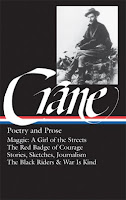From Stephen Crane: Prose & Poetry
Interesting Links
“Stephen Crane at the Front“ (Roy Morris, Jr., HistoryNet)
“Rediscovered slides of Spanish-American War” (Federal News Network)
Other Story of the Week selections by Stephen Crane
• “The Bride Comes to Yellow Sky”
• “An Experiment in Misery”
• “When Man Falls, a Crowd Gathers”
Buy the book
 Stephen Crane: Prose & Poetry
Stephen Crane: Prose & Poetry
Includes The Red Badge of Courage, Maggie, George’s Mother, The Third Violet, “The Monster,” other stories, journalism, poetry, and more
1,379 pages
List price: $50.00
Web store price: $35.00
“Stephen Crane at the Front“ (Roy Morris, Jr., HistoryNet)
“Rediscovered slides of Spanish-American War” (Federal News Network)
Other Story of the Week selections by Stephen Crane
• “The Bride Comes to Yellow Sky”
• “An Experiment in Misery”
• “When Man Falls, a Crowd Gathers”
Buy the book
 Stephen Crane: Prose & Poetry
Stephen Crane: Prose & PoetryIncludes The Red Badge of Courage, Maggie, George’s Mother, The Third Violet, “The Monster,” other stories, journalism, poetry, and more
1,379 pages
List price: $50.00
Web store price: $35.00
 |
| The Scream of Shrapnel at San Juan Hill, 1898, oil on canvas by American painter Frederic Remington (1861–1909). Image courtesy of the Yale University Art Gallery. |
Crane was the coolest man, whether army officer or civilian, that I saw under fire at any time during the war. He was most annoyingly cool, with the assurance of a fatalist. . . . The fire from the enemy was so heavy that only one troop along the entire line of the hills was returning it, and all the rest of our men were lying down. General [Leonard] Wood, who was then colonel of the Rough Riders, and I were lying on our elbows at Crane’s feet, and Wood ordered him also to lie down. Crane pretended not to hear, and moved farther away, still peering over the hill with the same interested expression. Wood told him for the second time that if he did not lie down he would be killed, but Crane paid no attention. So, in order to make him take shelter, I told him he was trying to impress us with his courage and that if he thought he was making me feel badly by walking about, he might as well sit down. As soon as I told him he was trying to impress us with his courage, he dropped on his knees, as I had hoped he would, and we breathed again.The following week Crane’s friends found him suffering from fever (probably due to malaria exacerbated by tuberculosis) and on July 9 put him aboard a ship heading back to Virginia. That same day, he somehow fired off his last war dispatch, in which he chides readers who are “dying to hear the names of the men who are conspicuous for bravery”:
The main fact that has developed in this Santiago campaign is that the soldier of the regular army is the best man standing on two feet on God’s green earth . . . . The public doesn’t seem to care very much for the regular soldier. The public wants to learn of the gallantry of Reginald Marmaduke Maurice Montmorenci Sturtevant, and for goodness sake how the poor old chappy endures that dreadful hard-tack and bacon. Whereas, the name of the regular soldier is probably Michael Nolan and his life-sized portrait was not in the papers in celebration of his enlistment. Just plain Private Nolan, blast him—he is of no consequence. He will get his name in the paper—oh, yes, when he is “killed.” Or when he is “wounded.” Or when he is “missing.”Crane expanded his brief, contentious piece about “Private Nolan” into one of his best short stories, “The Price of the Harness,” published in England in Blackwood’s Edinburgh Magazine. After the story appeared, Joseph Conrad immediately wrote to Crane that the story “was the best bit of work you’ve done (for its size) since the Red Badge. There is a mellowness in the vigour of that story that simply delighted me.”
When the story was reprinted in the United States in Cosmopolitan, the magazine’s owner and editor, John Brisben Walker, decided to change the title to “The Woof of Thin Red Threads,” a phrase taken from the fifth section of the story. “Damn Walker,” Crane wrote angrily to his agent. “The name of the story is ‘The Price of the Harness’ because it is the price of the harness, the price men paid for wearing the military harness, Uncle Sam’s military harness; and they paid blood, hunger and fever. Let him if he likes conjure some inflammatory secondary title. He is a fool.”
* * *
Twenty-five men were making a road out of a path up the hillside. The light batteries in the rear were impatient to advance, but first must be done all that digging and smoothing which gains no incrusted medals from war. . . . If you don't see the full selection below, click here (PDF) or click here (Google Docs) to read it—free!This selection may be photocopied and distributed for classroom or educational use.